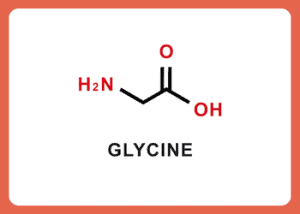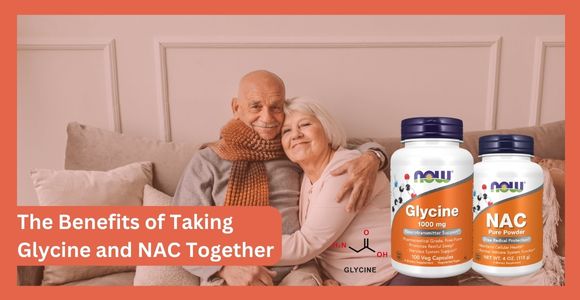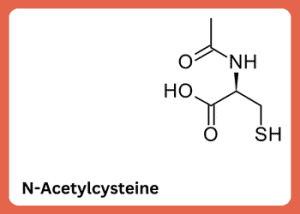Could scientists have discovered the secret to eternal youth? Not yet, but a recent study published in Nutrients suggests that there is hope. The research revealed that when mice were given GlyNAC – a special supplement – their life expectancy was extended by an impressive 24%. While more tests are needed for conclusive results, this discovery signifies great promise!
GlyNAC is a powerful concoction of glycine and N-acetylcysteine that has the potential to be converted into your body’s main defense against oxidative stress: glutathione.
It is essential to remember that although it contains the same elements, this combination does not equal either NAC or Glutathione alone.
According to the authors of this study, both cysteine and glycine are necessary for Glutathione (GSH) synthesis. If a supplement only provides NAC-alone, then it will not provide enough glycine; however, GlyNAC supplies both of these requirements which is essential in GSH production.
Table of Contents
What are Glycine and N-Acetylcysteine (Glynac)?
Sure, here is some detailed information:
What is Glycine?
- Glycine is an amino acid that is a building block for proteins in the body.
- It is involved in various physiological processes, including the synthesis of important molecules such as creatine, heme, and glutathione.
- Glycine supplement has been shown to have potential health benefits, such as improving sleep quality, reducing inflammation, and protecting against oxidative stress.
- It may also have a role in promoting muscle growth and improving exercise performance.
- In addition to being found in food sources such as meat, fish, and dairy, glycine is available as a dietary supplement in powder, capsule, and tablet form.
What is N-Acetylcysteine (NAC)?
- NAC is a modified form of the amino acid cysteine, which plays a role in the synthesis of glutathione, a powerful antioxidant in the body.
 It has been used for decades as a treatment for acetaminophen (paracetamol) poisoning due to its ability to replenish glutathione stores in the liver.
It has been used for decades as a treatment for acetaminophen (paracetamol) poisoning due to its ability to replenish glutathione stores in the liver.- NAC has also been studied for its potential benefits in a variety of other health conditions, such as chronic obstructive pulmonary disease (COPD), mental health disorders, and substance abuse.
- It has antioxidant, anti-inflammatory, and mucolytic properties, meaning it can help break up and expel mucus in the respiratory tract.
- NAC is available as a dietary supplement in capsule, tablet, and liquid form.
Here are some additional scientific facts and research findings:
- Glycine has been shown to improve sleep quality and reduce the time it takes to fall asleep in human studies. It may work by lowering body temperature and promoting relaxation.
- Glycine may help reduce inflammation by modulating the production of cytokines, which are proteins that regulate the immune response in the body.
- Some animal studies have suggested that glycine may have a protective effect on the liver by reducing inflammation and oxidative stress.
- NAC has been studied for its potential benefits in chronic bronchitis, a type of COPD, due to its mucolytic properties. It improves cough and respiratory symptoms in people with this condition.
- NAC has been shown to have potential benefits in reducing symptoms of depression and anxiety in human studies, possibly due to its antioxidant and anti-inflammatory properties.
- NAC may also be useful in reducing cravings and withdrawal symptoms in people with substance abuse disorders, particularly in the case of cocaine and nicotine addiction.
- There is some evidence that NAC may have a role in improving cognitive function and memory, particularly in older adults. This may be due to its ability to increase levels of glutathione and reduce oxidative stress in the brain.
What is NAC with glycine used for? N-Acetylcysteine (NAC) with glycine is sometimes used as a dietary supplement to support overall health, improve exercise performance, and reduce inflammation and oxidative stress.
NAC and Glycine Benefits
Recent years have seen an abundance of research into the health benefits of two amino acids: N-Acetylcysteine (NAC) and glycine. In this article, we’ll not only review their potential advantages but also delve into how they work in our bodies.
N-Acetylcysteine:
N-acetylcysteine (NAC) is an amino acid that serves as a precursor to glutathione, the human body’s most essential antioxidant.
Utilizing this form of cysteine can help fortify our systems and protect us from radical damage. NAC has been shown to have a variety of health benefits, including:
- Antioxidant activity: NAC is an incredibly powerful antioxidant that can help safeguard cells from the damage caused by free radicals, which are highly reactive molecules responsible for oxidative stress.
- Liver support: Clinical research has proven that NAC plays a key role in strengthening liver function: it enhances the production of glutathione, which purges toxins from the organ.
- Respiratory health: NAC is widely used to treat respiratory problems, such as COPD and bronchitis. This is because it has the capacity to thin mucus in the lungs and enhance lung functioning.
- Mood support: NAC has been revealed to have a beneficial effect on our moods, likely due to its power in moderating the levels of glutamate- an excitatory neurotransmitter that can be dangerous at higher concentrations.
Glycine:
Glycine, a non-essential amino acid, is essential to many bodily processes, playing an integral role in the synthesis of proteins, DNA, and neurotransmitters.
 By supplementing with glycine you may experience numerous benefits including:
By supplementing with glycine you may experience numerous benefits including:
- Sleep support: Glycine has been demonstrated to enhance the quality of sleep by facilitating a sense of relaxation and shortening the time needed to fall asleep.
- Joint health: By supplementing with glycine, the main structural protein found in connective tissues, joint health can be enhanced and improved.
- Cognitive function: Recent studies suggest that glycine can have a beneficial impact on cognitive performance, possibly as it functions as an essential neurotransmitter in the brain.
- Immune support: Glycine has been scientifically proven to bolster the immune system by stimulating the development of cytokines, molecules that serve as mediators in controlling immunity.
Mechanisms of action:
While scientists are still investigating the precise mechanics of NAC and glycine, research suggests that these substances may work to improve overall health by functioning through various pathways.:
- Antioxidant activity: Research has demonstrated that NAC + glycine supreme exhibit antioxidant properties, thereby potentially guarding cells against oxidative stress-induced inflammation.
- Neurotransmitter modulation: NAC and glycine have the potential to regulate levels of neurotransmitters, like glutamate and GABA. This could potentially lead to improvements in mood, and cognitive performance, as well as better sleep quality.
- Collagen synthesis: Essential for preserving the structural integrity of tissues, Glycine is instrumental in the production of collagen – particularly those that encompass our body’s connective joints.
- Immune modulation: NAC and glycine have been demonstrated to regulate the immune system by stimulating cytokines, which are key molecules for regulating immunity.
In short, NAC and glycine are two amino acids that provide a wide range of health benefits; from their antioxidant activity to liver support, respiratory health, and beyond.
The exact ways in which they go about this remain largely unknown, yet research suggests that it may be through the modulation of neurotransmitters, collagen synthesis, immune cells, or even antioxidants themselves.
Nac and Glycine Dosage
N-Acetylcysteine (NAC) and Glycine are both dietary supplements that have various potential health benefits. The dosage for these supplements can vary depending on several factors such as age, gender, weight, health condition, and the reason for taking them.
 For N-Acetylcysteine (NAC), the typical dosage ranges from 600 to 1800 mg per day, divided into two or three doses. However, for certain health conditions, such as liver disease, higher doses may be required, and it’s important to consult with a healthcare professional for appropriate dosing.
For N-Acetylcysteine (NAC), the typical dosage ranges from 600 to 1800 mg per day, divided into two or three doses. However, for certain health conditions, such as liver disease, higher doses may be required, and it’s important to consult with a healthcare professional for appropriate dosing.
As for glycine, the recommended dosage can also vary depending on the reason for use.
For example, doses for sleep and relaxation can range from 3 to 5 grams taken at bedtime, while doses for improving athletic performance can range from 10 to 20 grams taken before exercise.
However, it’s recommended to start with a lower dosage and gradually increase it over time, and to consult with a healthcare professional before using glycine for any specific purpose.
It’s important to note that dietary supplements are not regulated in the same way as prescription medications, so it’s important to use them cautiously and under the guidance of a healthcare professional to ensure they are safe and effective for your individual needs.
Frequently Asked Questions
Does Glycine Increase Glutathione?
Struggling with insomnia? Consider trying Andrew Huberman’s Sleep Cocktail. Composed of Magnesium L-Threonate, Theanine, and Apigenin, this powerful blend has been clinically proven to provide restful sleep.
 Additionally, Tongkat Ali and Fadogia Agrestis are naturally sourced supplements that have also been scientifically tested – they not only improve sexual desire but can boost testosterone levels as well. Try them today for improved overall well-being.
Additionally, Tongkat Ali and Fadogia Agrestis are naturally sourced supplements that have also been scientifically tested – they not only improve sexual desire but can boost testosterone levels as well. Try them today for improved overall well-being.
What Should You Not Take with NAC?
NAC treatment may amplify the effects of certain immunosuppressive drugs, like Imuran and Cytoxan, or Deltasone. Before taking NAC with any of these substances, be sure to consult your doctor.
Is Glycine and NAC Anti Aging?
In a groundbreaking human clinical trial carried out by researchers at Baylor College of Medicine, the efficacy of GlyNAC – a combination of glycine and N-acetylcysteine – was seen in tackling age-related issues among older adults. Results also highlighted that this supplement could be key to attaining healthy aging.
Glynac Supplement Where to Buy?
To be certain that you are getting the right level and combination of both, it is necessary to choose a trustworthy vendor. This supplement may also be available at select health food stores or specialty retailers. Be sure to review the product packaging carefully before purchasing.
When to Take NAC, Morning or Night?
N-acetylcysteine (NAC) is a powerful antioxidant and precursor to glutathione, one of the body’s most important antioxidants. Its benefits include liver support, detoxification, immune system enhancement, and protection against oxidative stress. When considering the optimal time to take NAC, several factors come into play, including its pharmacokinetics, potential interactions with other supplements or medications, and individual health goals.
Morning Dosing
Taking NAC in the morning can be beneficial for several reasons:
Energy and Detoxification: NAC supports detoxification processes and enhances glutathione production, which helps mitigate oxidative stress that occurs during the day due to environmental exposures and metabolic processes. By taking it in the morning, you provide your body with antioxidant support throughout the day.
Synergy with Other Supplements: Many people take supplements like vitamins C and E in the morning. These vitamins work synergistically with NAC to combat oxidative stress. Taking them together can enhance overall antioxidant activity.
Avoiding Insomnia: NAC has mild stimulant effects for some individuals. Taking it in the morning can prevent any potential interference with sleep, ensuring a restful night.
Night Dosing
Conversely, taking NAC at night has its advantages:
Liver Support: The liver performs significant detoxification activities during sleep. Taking NAC at night can enhance this process by increasing glutathione levels, aiding in the removal of toxins accumulated throughout the day.
Antioxidant Replenishment: During sleep, the body undergoes repair and regeneration. NAC can support these processes by replenishing antioxidant levels and repairing oxidative damage incurred during the day.
Consistency with Certain Medications: For those taking NAC as part of a treatment regimen for chronic conditions, such as respiratory illnesses, consistency in timing (often recommended in the evening) can be crucial for maintaining stable blood levels of the supplement.
Individual Considerations
The optimal timing for taking NAC also depends on personal health goals and lifestyle factors:
Stress Levels: If stress levels are higher in the morning, taking NAC then can help manage oxidative stress throughout the day.
Sleep Patterns: If sleep quality is an issue, avoiding NAC at night might be preferable due to its potential mild stimulant effects.
Medical Conditions: Individuals with specific health conditions should follow their healthcare provider’s recommendations regarding NAC timing.
Ultimately, the best time to take NAC depends on individual needs and health goals. Morning dosing may provide antioxidant support throughout the day and synergize with other supplements, while evening dosing can enhance nighttime detoxification and repair processes. Consulting with a healthcare provider can help determine the optimal timing based on personal health circumstances.
Conclusion
Studies conducted on rodents have proven that supplementing with GlyNAC can significantly extend their lifespan. Not only does it correct GSH deficiency, OxS, and other aging features such as lagging mitochondrial function and nutrient sensing issues but also reduces genomic damage in organs like the heart, liver, and kidneys.
Supplementation of GlyNAC could potentially be a game-changer to ensure healthy aging not just for humans but also enhance both healthspan (the period of life free from serious diseases) and lifespan.

 It has been used for decades as a treatment for acetaminophen (paracetamol) poisoning due to its ability to replenish glutathione stores in the liver.
It has been used for decades as a treatment for acetaminophen (paracetamol) poisoning due to its ability to replenish glutathione stores in the liver.